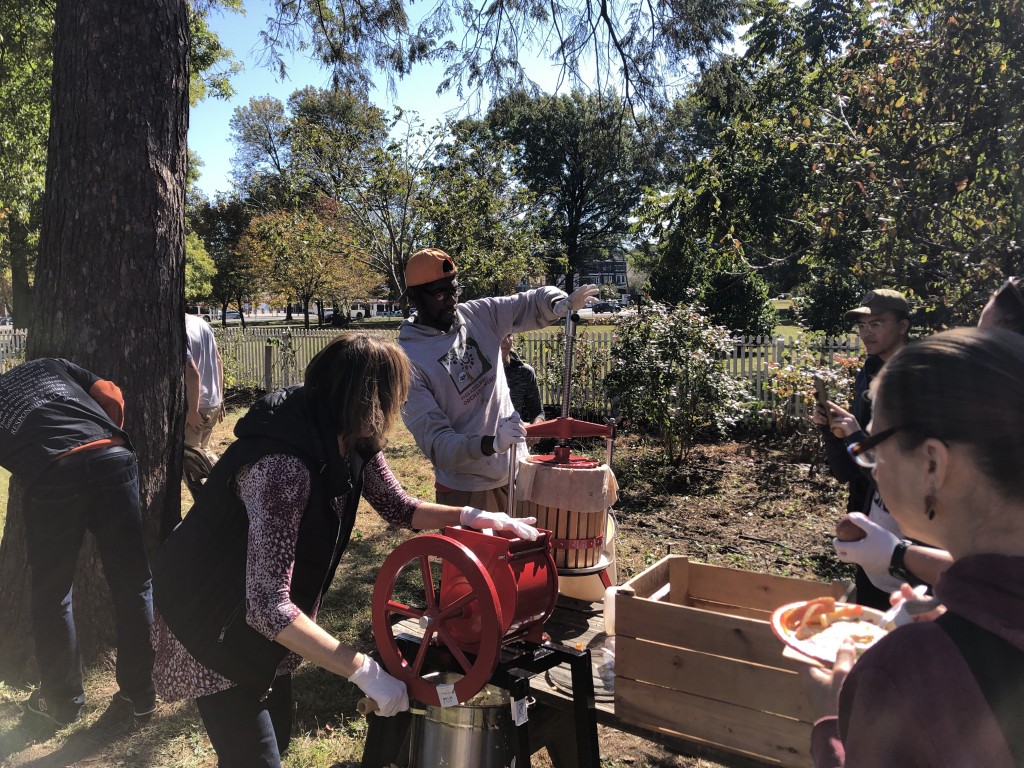Earlier this harvest season, one of our members, Hess Brothers of Pennsylvania, donated apples to a cider festival. Through the festival, we connected with an inspiring organization that is transforming communities across Philadelphia by educating and involving area residents in a process near and dear to us: growing tree fruits.
Philadelphia Orchard Project (POP), is a nonprofit founded in 2007 with a mission to plant and support community orchards across Pennsylvania’s largest city. Now in its twelfth year, it partners with 64 orchard sites city-wide. They work to “support a healthy ecosystem to grow fruits and nuts that expands food access and makes better use of the land,” says Kim Jordan, POP’s Development Director.
POP’s partner orchard sites are community-initiated, organized, and maintained with the backing of interested neighbors, congregation members, nonprofit staffs, schools and other community members. They plant in a variety of community spaces—from church grounds and recreation centers to large public gardens that have more than 150 trees.

Communities of all kinds across the city have taken up the project—including schools, religious communities, hospitals, recreation centers and neighborhood associations. They often start with grassroots signature campaigns, and volunteer crews help with ongoing maintenance to ensure the orchards thrive long past their first season. POP tries to focus on areas of the city that lack regular access to fresh and healthy foods, so the produce can be shared or distributed in a way that benefits each community directly. The highest concentration of orchards is in west and north-central Philadelphia, with some in south Philly as well.
Orchard applications are vetted rigorously by POP’s staff to ensure that applicant communities have enough existing support to ensure year-round success for the long-term. Rather than moving into a new area and beginning to plant, individual communities approach POP and make their case for why a community orchard can thrive in their area.
“We have never gone to any particular site and planted; groups have come to us and want to replicate it in their community,” says Jordan.
POP’s internal team is small but mighty. From ensuring that orchards are properly maintained to training volunteers across the city to producing free horticultural curriculum that meets Pennsylvania state standards and making it available online for teachers, this team is busy and their impact is growing.

Their resource center offers information on a wide range of topics, from orchard care and pest guidance to recipes and food preservation techniques. While some of the resources cover technical topics, they are intended for general audiences, and seek to bridge the gap for people who have little to no working horticultural knowledge. Over time, the curriculum helps them build those skills. Recurring classes help volunteers build confidence that they can take back to their communities and share with others.
Volunteer orchard liaisons take on the responsibility of serving as the primary point of contact between POP and a partner orchard, help to coordinate other volunteers and events, ensure the orchards have what they need and play a critical role in getting new sites up and running.
POP’s model relies on these liaisons and their partner communities developing a strong understanding the process and methods behind every single piece of produce they grow—from the preparation of the soil and pruning of trees in the off-season to planning what the orchard will grow, so that there is ripe fruit during different times of the year. In addition to apples, orchards have grown other tree fruits like peaches, cherries, figs, and pears. They also plant a variety of shrub and berry bushes, vines, perennial vegetables, herbs, flowers, and nut trees. POP follows a permaculture forest gardening technique, using layers of different kinds of trees, bushes and perennials to improve the soil’s fertility, attract helpful pollinators and other insects and deter pests.
Not only do these orchards become spaces of learning and produce nourishing foods that support the communities that grow them, but also they are active spaces where communities gather and celebrate. They offer events throughout the year, some of which bring together communities and POP’s sponsors, but often they are a time when communities gather and enjoy the fruits of their labor, like cider events and winter wassailing.

POP relies on partner feedback and input to ensure their School Orchard Program curriculum, orchard maintenance resources, and other strategic efforts are meeting the needs of the communities they support. They engage with educators to find out which tools and lesson plans make sense in the classroom, so the curriculum is useful in practice—for kindergarteners, high school students, and everyone in between.
“Curriculum is designed to meet the partner needs. What do they need to know to be more successful?” says Jordan.
In recent feedback, they learned that some partner orchards were picking fruit too early, and volunteers needed more guidance on determining when fruit is ripe enough for picking. They developed new resource guides and recipe cards on when to pick the fruit, what to do with the fresh fruit, and also translated the resources into Spanish.
Recently, POP worked on a project with college students at Penn State to study pollinators. They have offered courses on the various uses of fruits, nuts and herbs, and bring in outside educators who have culinary, medicinal or cultural knowledge to share with classes. They provide plant info sheets and weed ID guides to help partners maintain their orchards.

Some of the biggest ongoing challenges POP faces are not in getting orchards up and running but making sure that they are maintained over time. Nonprofit staff turnover rates are often higher than average, which means training new people is a common occurrence, and keeping other members of the community regularly engaged and involved beyond a few leaders requires dedicated, ongoing grassroots support. POP’s partners are encouraged to donate and provide reimbursement funding for trainings where possible, but POP’s services are free. Relying on an abundant bank of resources helps get volunteers up to speed.
“We’ve had a number of groups reaching out to us for advice. We seem to be the first group with this model,” says Jordan.
In 2014, the organization launched POPHarvest, a group gleaning program where volunteers forage lesser-known fruits, nuts, herbs, and other plants that grow around the city. In 2018, they held 19 POPHarvest events and gathered nearly 500 pounds of food to be prepared, preserved and shared. They launched a pilot program in 2018 as well, POPHarvestEd, to incorporate more collaborative learning experiences that help people practice new ways of preparing or using some of these lesser-known fruits with which they may not be familiar or comfortable using.
“Food is great way of connecting with people. Once you’ve seen it grow from a little sapling to producing fruit—and seeing people be able to try it and connect with people through that is powerful,” says Jordan.
To learn more about POP’s mission, resources and education programs, visit their website.
Photos provided by Philadelphia Orchard Project.








